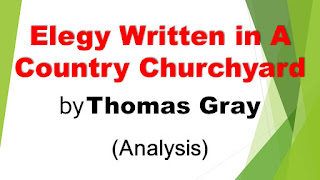Elegy Written in A Country Churchyard
by
Thomas Gray
(Analysis)
Gray’s poetry was so unfamiliar to his Age and
so unlike the sort of poetry in vogue that it, on its production astonished his
contemporaries.
Analysis
The
Elegy is perhaps the most widely known poem in English. With the exception of
certain works of Byron and Shakespeare, no English poem has been so widely
admired and imitated abroad. The secret of this extensive popularity is that it
beautiful expresses feelings and thoughts that are common to the human breast. It
describes to us our own grief and our own sufferings. It is indeed, a cry of
human sympathy.
It
always finds some disposition of our mind favourable to receive it, some passion
which cannot resist its power and some feelings which participate in its sorrow.
In the current of the thoughts of the Elegy, there is nothing that is rare or
exceptional or out of the common way. In the reflections of the elegy, it is
difficult to conceive of anyone musing under similar circumstances who should
not muse in the way Gray has done. There are some feelings and thoughts that
cannot grow old. The mystery of life does not become clearer, or less solemn
and awful, for any amount of contemplation. Such questions, inevitable and
everlasting as they are, do rise in the mind when one reflects on Death, and
they can never lose their freshness, never cease to fascinate and move us.
It
is with such questions that the Elegy deals. It deals with them in no lofty philosophical
manner, but in a simple, humble, homely way, always with the trust and broadest
humanity. The poet’s thoughts turn to the poor; he forgets the tombs inside the
church and thinks only for the “moldering heaps”. In dealing with them, he
faces problems, - problems of the brevity of life, of the certainty of pain, of
death and of the helplessness of man. In these problems, he keeps on brooding
and his meditations take a deeper and more universal meaning. The Elegy,
therefore, is the outcome of the lonely meditations and musings of his obscure
and secluded life. It is a poem, which has reached the hearts of mankind.
There
are other merits which this poem possesses, and these merits go to add to the
popularity of this poem. It possesses the charm of incomparable felicity of a
melody, that is not too subtle to delight every hearer, of a moral persuasiveness
that appeals to every generation and of a metrical skill that in each line
proclaims the master. Gray himself was, however, of the opinion that the
popularity of the Elegy was due to the subject and if the subject had been treated
of in prose, it would have been equally popular.
Gray
is considered to be the most original of all the transitional poets in the selection
of his themes. It is in his poetry that we have, for the first time, a departure
from the treatment of urban life. Poetry of the classical age, written under
the inspiration of Alexander Pope, is purely related to the depiction of urban
life, the fashions of the ladies and the manners of the Court. Gray is the first
poet who depart from this beaten track of town life and concentrates his attention
on the Middle Ages and the Norse and Scandinavian mythology.
Gray
was alive to the external manifestations of Nature and observed them curiously,
as is clear from his reflections in his poems. Instead of being fresh and new,
his visions of Nature are discreet and pretty. They are objective. The sublimity
of the Alps and the horror of high mountains are frank expressions of his
visions. Again, in the opening lines of the “Elegy”, he presents the close of
the day remarkably and beautifully.
The
versification of Gray possesses exquisite musical sweetness and about his diction
he himself tells that “The style I have aimed at, is extreme conciseness of
expression yet pure perspicuous and musical.” Gray’s style has the dignity of
Milton and stately march of his verse resemble that of Dryden. The fondness of
elegance coupled with the use of musical cadences, which is the characteristic trait
of Gray, imparts to his poem a rich rhythmical harmony and solemn musical effect.










0 Comments